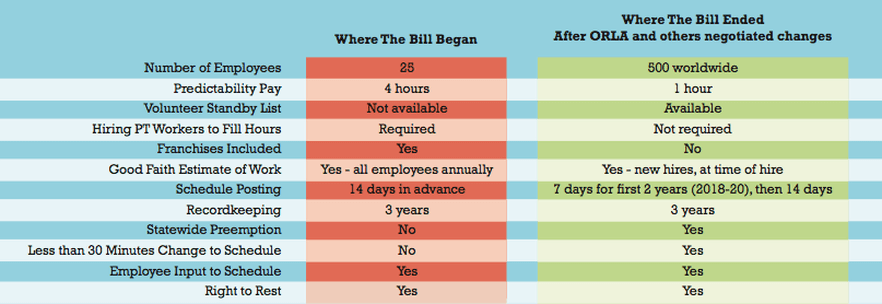Scheduling Law
Oregon's Scheduling Law
In 2017, ORLA worked alongside other business groups to successfully advocate for major improvements to SB 828, Oregon's restrictive scheduling bill. Thanks to strong member engagement and real-world stories from the hospitality industry, most restaurants and lodging businesses were ultimately excluded from the bill’s requirements. For those who are impacted, the law is now far more practical and workable—a direct result of unified industry advocacy.
Scheduling Law: Mitigated Impacts
The chart below outlines the progression of the scheduling legislation—from its original proposal to the final version—highlighting the potential challenges employers could have faced and the significant improvements achieved through industry advocacy.

Understanding Components of the Law
Predictability Pay
Employers must compensate employees with one hour of pay at the employee’s regular rate of pay, in addition to wages earned, when the employer:
- Adds more than 30 minutes of work to the employee’s work shift; or
- Changes the date or start or end time of the employee’s work shift with no loss of hours
- Schedules the employee for an additional work shift or on-call shift
Employers must compensate employees one-half times the employee’s regular rate of pay per hour for each scheduled hour that the employee does not work when the employer:
- Subtracts hours from the employee’s work shift before or after the employee reports for duty;
- Changes the date or start or end time of the employee’s work shift, resulting in a loss of work shift hours;
- Cancels the employee’s work shift; or
- Does not ask the employee to perform work when the employee is scheduled for an on-call shift (i.e. if they were supposed to work an eight-hour shift and get called off, they still get half-time pay for eight hours or four hours of pay).
The employer does not have to pay penalty pay if you utilize the voluntary standby list or if an employee initiates shift-swaps.
Volunteer Standby List
An employer may maintain a standby list of employees whom the employer will request to work additional hours to address unanticipated customer needs or unexpected employee absences if the listed employees have requested or agreed in writing to be included on the standby list and the employer notifies each employee in writing. No penalty pay is required to be paid if you utilize the voluntary standby list and can have employees sign up for this list at the time of hire or add their name at any time.
Hiring Part-time Workers to Fill Hours
Originally, employers would need to advertise and try to hire internally only to part-time workers if they had additional hours to offer before seeking to hire outside workers for the part-time hours.
Good Faith Estimate of Work
An employer shall provide a new employee with a written good faith estimate of the employee’s work schedule at the time of hire. The estimate may be based on previous years’ hours.
Less Than 30 Minutes Change to Schedule
Employees may stay on shift up to 30 minutes and/or employers can require employees to stay on shift for up to 30 minutes with no predictability pay penalty.
Franchises
Franchises are included if the individual franchisee has locations totaling 500 employees or more that work in the type of services covered (i.e., janitors do not count towards 500).
Employee Input to Schedule
In the original version, employers were required to attempt to accommodate a worker’s request for schedule and could be penalized if they did not. In the final version, there is not a penalty if the employer is unable to accommodate the employee’s request and the language clarifies the employer is under no obligation to grant employee’s request.
Right to Rest
The “right to rest” provision requires 10 hours in between shifts. The final version allows an employee to consent to work before the 10 hours is fulfilled but employer must pay one-and-a-half times rate of pay (i.e., “clopening”).
Does This Law Apply to Me?
You are subject to Oregon's scheduling law if:
- You have 500 or more employees as a corporate entity (chains are included but franchises are not unless the franchisee entity has 500 or more employees) and
- You are in the foodservice or hospitality industries defined by the NAICS codes in the bill
You are not subject to Oregon's scheduling law if:
- You have less than 500 employees
- You are NOT in the foodservice, hospitality, or retail industries defined by the NAICS codes in the bill
How to Prepare
Here are a few things employers can do to help navigate the restrictive scheduling law for their employees and businesses:
- Have a meeting with your employees to explain the new law, how it affects their schedule and what changes you may be thinking about making, if any, because of the new law – For example, after the law passed in San Francisco, some employers required employees to submit time off requests at least two weeks prior to the posting of the schedule. If a schedule needs to cover a 14-day period, employees have to submit time off requests at least 28 days in advance.
- Use the Voluntary Standby List – Employees can sign up or be taken off the Volunteer Standby List (VSL) at will. Those employees who decide to do so however, are more likely to pick up hours and shifts and increase their paychecks. Again, in San Francisco, when employees did not voluntarily pick up shifts, employers often did not fill them due to the financial penalties associated with mandating an employee fill a shift. This results in fewer employees needing to cover more responsibilities.
- Keep in mind the 30 minute rule – Employees may stay on shift up to 30 minutes and/or employers can require employees to stay on shift for up to 30 minutes with no predictability pay penalty. For employees this means they can close out tables/checks or finish their work without worrying about losing tips or wages, and for employers it means having some flexibility to overlap shifts if necessary to continue serving customers.
Frequently Asked Questions
What’s the “good faith estimate” of hours to new hires?
An employer shall provide a new employee with a written good faith estimate of the employee’s work schedule at the time of hire. The estimate may be based on previous years’ hours.
What does the “Employee Input to Schedule” clause mean?
In the original version, employers were required to attempt to accommodate a worker’s request for schedule and could be penalized if they did not. In the final version, there is not a penalty if the employer is unable to accommodate the employee’s request and the language clarifies the employer is under no obligation to grant an employee’s request.
With the new scheduling law, does a brewery fall into the category that would be affected?
Check the NAICS code to determine if your brewery falls into the "hospitality" or “food services and drinking places” category.
If two employees want to swap shifts, but in doing so would result in a “clopening,” is the employer liable to predictability pay?
This is covered under “Right to Rest Between Work Shifts”, sections (2) and (3): (2) An employee may request or consent to work shifts separated by less than 10 hours on a situational or on-going basis and may revoke such consent at any time during employment, provided that the employee follows the employer’s usual and customary procedures for making work schedule changes. (3) When an employee works during a rest period established by ORS 653.442.(1), the employer shall pay the compensation required by ORS 653.442(2) regardless of whether the employee requested or consented to work shifts separated by less than ten hours. The compensation must be paid to the employee no later than the regular payday for the pay period during which the work was performed.
We advise you to talk with an HR professional about adding or amending policy to only allow shift swaps resulting in “clopenings” with manager approval or similar language.
If you take hours away from the employee, what is the penalty?
Section 7 – Compensation for work schedule changes: An employer shall provide the following compensation to an employee for each employer requested change that occurs to the employee’s written work schedule without the advance notice required in section 5 of this 2017 Act
(a) One hour of pay at the employee’s regular rate of pay, in addition to wages earned, when the employer:
(A) Adds more than 30 minutes of work to the employee’s work shift;
(B) Changes the date or start or end time of the employee’s work shift with no loss of hours; or
(C) Schedules the employee for an additional work shift or on-call shift.
(b) One-half times the employee’s regular rate of pay per hour for each scheduled hour that the employee does not work when the employer:
(A) Subtracts hours from the employee’s work shift before or after the employee reports for duty;
(B) Changes the date or start or end time of the employee’s work shift, resulting in a loss of work shift hours;
(C) Cancels the employee’s work shift; or
(D) Does not ask the employee to perform work when the employee is scheduled for an on-call shift.
Short answer: One-half times the employee’s regular rate of pay per hour for each scheduled hour that the employee does not work.
What if there was a "mutual agreement" between the employee and employer to leave early?
Section 7: (3) The requirements for additional compensation in this section do not apply when:
(a) An employer changes the start or end time of an employee’s work shift by 30 minutes or less;
(b) An employee mutually agrees with another employee to employee-initiated work shift swaps or coverage. The employer may require that work shift swaps or coverage under this paragraph be pre-approved by the employer. The employer may assist employees in finding such arrangements, provided that any employer assistance must be limited to helping an employee identify other employees who may be available to provide work shift swaps or coverage and may not include the employer arranging the work shift swap or coverage;
(c) An employee requests changes to the employee’s written work schedule, including adding or subtracting hours, and the employee documents the request in writing;
(d) An employer makes changes to an employee’s written work schedule at the employee’s request under section 5 (6) of this 2017 Act;
Have further questions? Contact Greg Astley, Director of Government Affairs.
